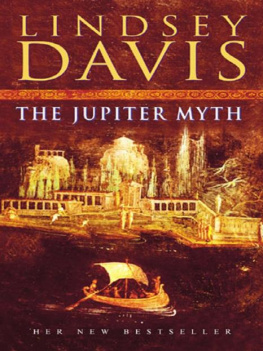Lindsey Davis - The Ides of April
Here you can read online Lindsey Davis - The Ides of April full text of the book (entire story) in english for free. Download pdf and epub, get meaning, cover and reviews about this ebook. year: 2013, publisher: Minotaur Books, genre: Detective and thriller. Description of the work, (preface) as well as reviews are available. Best literature library LitArk.com created for fans of good reading and offers a wide selection of genres:
Romance novel
Science fiction
Adventure
Detective
Science
History
Home and family
Prose
Art
Politics
Computer
Non-fiction
Religion
Business
Children
Humor
Choose a favorite category and find really read worthwhile books. Enjoy immersion in the world of imagination, feel the emotions of the characters or learn something new for yourself, make an fascinating discovery.

- Book:The Ides of April
- Author:
- Publisher:Minotaur Books
- Genre:
- Year:2013
- ISBN:9781250023698
- Rating:3 / 5
- Favourites:Add to favourites
- Your mark:
- 60
- 1
- 2
- 3
- 4
- 5
The Ides of April: summary, description and annotation
We offer to read an annotation, description, summary or preface (depends on what the author of the book "The Ides of April" wrote himself). If you haven't found the necessary information about the book — write in the comments, we will try to find it.
The Ides of April — read online for free the complete book (whole text) full work
Below is the text of the book, divided by pages. System saving the place of the last page read, allows you to conveniently read the book "The Ides of April" online for free, without having to search again every time where you left off. Put a bookmark, and you can go to the page where you finished reading at any time.
Font size:
Interval:
Bookmark:
Lindsey Davis
The Ides of April
I
Lucius Bassus was three years old when his mother took her eyes off him and he ran out of the house to play. They lived on the Clivus Publicius, a steep road on the Aventine Hill, where he was knocked down by a builder's cart. The cart, which escaped its driver's control as it sped down the slope, was owned by Metellus and Nepos, an outfit that worked from a yard on the hill. Nobody talked about Nepos; at first I thought he might be an invention for some tax fiddle.
This business was no more shady than most in Imperial Rome. It carried out refurbishments for bar owners who wanted to move up from blatantly sleazy to a pretence of hygiene. The custom was that the Metellus crew would tender for a full deep-clean and fancy renovation, promising to complete in eight weeks max. In practice, every project took two years and they skimped on the fittings. They would re-grout the marble counters, put in a new doorstep, provide a misspelt signboard and charge the earth for it. By then their clients, unable to operate in the permanent dustcloud, had lost their custom and were going under. It amazed me that other bar owners saw what happened yet still used the firm, but they did. Over the years Metellus and Nepos had done very nicely out of Roman rotgut-sellers innocently trusting them. But killing a child, in the close-knit Aventine community where we had some standards, just might be commercially stupid.
Lucius died at once from his injuries. He never stood a chance. He expired on the kerb. Inevitably, at that very moment his distraught mother came out of the house. It helped fuel local outrage.
The ramshackle cart had been overloaded. The draught oxen were both past their best. Their driver was blind drunk, no question. He denied that on principle, the principle being that Salvidia, the vinegary widow who had inherited the shopfitting business from the husband she had driven to his grave, would not pay his wages if he told the truth. There were witnesses, a large group of whom gathered in the Clivus and took an interest, but they all disappeared when a busybody produced a note tablet and started collecting names.
Once the funeral with its pathetic tiny coffin had been held, well-meaning neighbours started to suggest that the family were entitled to payment for their terrible loss. Everyone agreed they should immediately hire an informer to look into the legal aspects. If being hit on the head by a falling flower tub could be worth cash to the victim, what price a child's life under civil law? Someone (it was rumoured to be the note tablet busybody I mentioned) even wrote up on a wall a plea for concerned citizens who had been present at the accident to come forward. It must have appeared before the first of April, because I saw it that day, the Kalends. The poster sounded official. While not actually offering payment, it implied possible advantage. As a professional, I read it with interest. I found it subtly done.
By then, I had become involved. Any investigator who was favoured by Fortune would be taken on by the heartbroken mother to negotiate compensation. This was a public-spirited task, where a reputable person could maintain a clear conscience: you look into the facts, you put those facts to the guilty party succinctly, you say, "I am a top informer, this is meat and drink to me; a toddler is dead and a jury will be weeping into their togas, but nobody wants this to go to court, do we?" The guilty cough up, and you cream off your percentage.
Not me. Fortune never favoured me and the problem with being a woman was that sometimes I could only obtain business that all the male informers had sniffed and refused. This was one of those months, I was hired by Salvidia. The owner of Metellus and Nepos wanted me to help her beat off the mother's claim. Typical.
From what I have already said about this construction group, you will guess my employment was on a "no win, no fee" basis. Indeed, I was starting to feel its basis might amount to "win, but even then the bastards never pay up"-like so much of my work, unfortunately. After a week, I was ready to abandon the miserable project, but I had already put in quite a few hours and, besides, I never like to be defeated. The poster asking for witnesses suggested someone else felt the same way.
The wall graffiti included an address where people could make statements, so as my enquiries were stuck, I went along to see if any had done so. My line would be that as I was assisting a party in the dispute, I had the right to ask. As a female I had no rights at all in matters of law, but why let that stop me? Either way, I was hoping to plea-bargain. Anything to have this finished fast, so I could drop the case.
The address was the Temple of Ceres. It was close to my home and office, though on a far grander street than the blind alley I lived in. Anywhere would be finer than that. Fountain Court holds no attractions for the founders of fine religious buildings.
Arranging assignations at temples is common in Rome. For strangers it is neutral ground. For instance, married men find the steps of temples convenient for picking up prostitutes. The grander the temple, the lousier its hangers-on. Inured to the seamy side of our city, the public pass by without noticing. Suggesting a meet at a temple was, I presumed, simply for convenience. Thinking little of it, I went along on spec.
Only when I asked for the contact on the wall notice did I learn he was a big prawn in a purple-edged toga who belonged to an ancient order of magistrates. The Temple of Ceres was their headquarters and archive depository.
I reconsidered. Then I went home and made alterations to my appearance. I was visiting the office of men of great consequence in Rome: men of wealth and power. I did not suppose "Manlius Faustus" had chalked up graffiti on the Clivus Publicius in person, but some minion certainly did it in his name. That minion must have felt confident Faustus would enjoy throwing his weight about. By definition this magistrate was one of those menaces who drive traders wild checking market weights. I had been trained by my father to avoid such types, though in fact those over-promoted snoots don't tangle with me. I have contacts, but no one that important.
Still, it always pays to respect the opposition. So I changed into a full-length tunic in a neutral shade, not white, not quite unbleached linen, but neat, tidy and unthreatening. It did have an embroidered neckline that suggested money, which in turn hints at a woman with influential men behind her, one who should not be too quickly or too rudely dismissed.
My earrings were plain gold rosettes. I added a row of bangles, to give me confidence. Hair pinned up. Three dabs of a discreet perfume. A large stole: the demure, respectable widow look. I really am a widow, so that part was right.
Mother had taught me how to pose as a meek matron. It was ridiculous and hypocritical, but the act now came as second nature and I could manage it without laughing.
So, feeling convinced that I was as good as them and could handle these bastards, I set off for my first encounter with the plebeian aediles.
II
The Temple of Ceres was so local to me that I normally ignored it. It sat on the northern slope of the Aventine, a short walk halfway uphill from the starting-gates end of the Circus Maximus. A chunky edifice, it was designed in the remote past and looked more Greek than Roman in an archaic way; the heavy grey columns surrounding it had thick bases and curious capitals that, if you care to know such stuff, were neither Ionic nor Doric. I believe the word is "transitional." I don't suppose the distinction bothered many people; most probably never looked up high enough to notice. But I had spent my childhood a thousand miles from Rome, in a backwoods town that had been laid waste in a revolt and still lacked interesting architecture; when an effort has been made to build something unusual, I pay polite attention.
Font size:
Interval:
Bookmark:
Similar books «The Ides of April»
Look at similar books to The Ides of April. We have selected literature similar in name and meaning in the hope of providing readers with more options to find new, interesting, not yet read works.
Discussion, reviews of the book The Ides of April and just readers' own opinions. Leave your comments, write what you think about the work, its meaning or the main characters. Specify what exactly you liked and what you didn't like, and why you think so.















